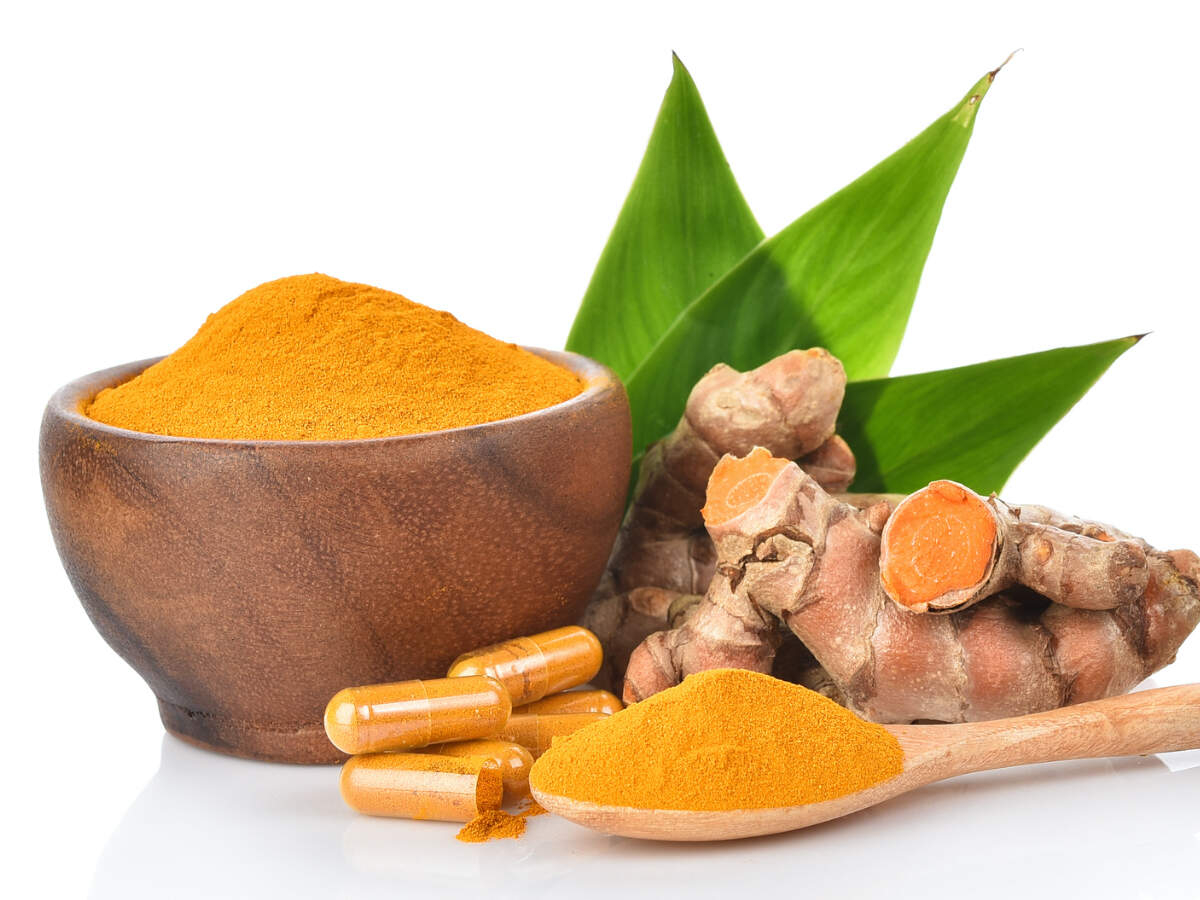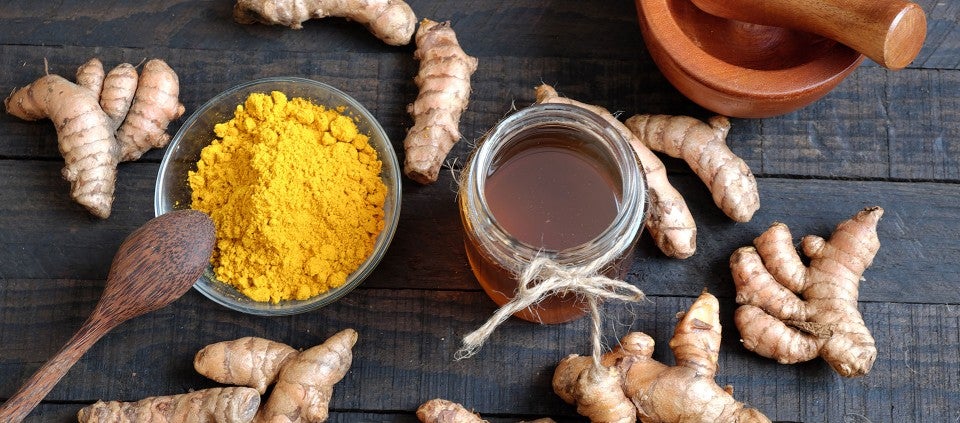Here’s a comprehensive blog on India’s golden spice – Turmeric!
- Introduction
- History of Turmeric
- Medicinal Benefits of Turmeric
- 10 Benefits of Turmeric
- Side Effects of Turmeric
- How to consume turmeric?
- Reference
Introduction
Turmeric is known as the golden spice of India. Its scientific name is Curcuma longa but popularly known as haldi, haridra, manjal, etc. in Indian languages. It’s a super-spice whose beneficial effects include antibacterial, antiviral, anti-inflammatory, cardioprotective, hepatoprotective, nephroprotective, antitumor, antioxidant, antiseptic, radioprotective, and digestive activities. It has huge religious, medicinal and culinary significance in the Indian subcontinent. It is widely used as a spice in South Asian and Middle Eastern cuisines. On average Asians consume about 200–1000 mg of turmeric in a day.

History of Turmeric
Turmeric has a long history of medicinal use, dating back nearly 4000 years to the Vedic culture in India. It probably reached China by 700 AD, East Africa by 800 AD, West Africa by 1200 AD, and Jamaica in the eighteenth century. Modern medicine has begun to recognize its importance, as indicated by the over 3000 publications dealing with turmeric that came out within the last 25 years. India produces nearly all the world’s turmeric and consumes nearly 80% of it. With its inherent qualities and high content of curcumin, Indian turmeric is considered the best in the world. Today, turmeric is promoted as a dietary supplement for a variety of conditions, including arthritis, digestive disorders, respiratory infections, allergies, liver disease, depression, and many others. Susruta’s Ayurvedic treatise, dating back to 250 BC, recommends an ointment containing turmeric to relieve the effects of poisoned food.

Medicinal Benefits of Turmeric
In Ayurvedic practices, turmeric is thought to have many medicinal properties including:
• strengthening the overall energy of the body,
• relieving gas,
• dispelling worms,
• improving digestion,
• regulating menstruation,
• dissolving gallstones, and
• relieving arthritis.
Many South Asian countries use it as an antiseptic for cuts, burns, and bruises, and as an antibacterial agent. Turmeric paste is applied to the skin of the bride and groom before marriage in India, where it is believed to make the skin glow and keep harmful bacteria away from the body. Turmeric is currently used in the formulation of several sunscreens. Several multinational companies are involved in making face creams based on turmeric.
Turmeric paste is used by women in some parts of India to remove superfluous hair. Today’s women who manage their work and household chores efficiently are surely more stressed. This can cause women to experience increased stress internally, leading to hormonal imbalances and menstrual disorders. These are some of the biggest health issues facing women and girls today. Turmeric can play a big role in such conditions. Turmeric is a plant that warms the body and helps to regulate menstruation and balance hormones. It has properties that help to stimulate menstrual flow. In addition, the antispasmodic and anti-inflammatory properties of turmeric also help women to avoid menstrual cramps.
Turmeric generally is used as an herbal medicine for:
- rheumatoid arthritis,
- chronic anterior uveitis,
- conjunctivitis,
- skin cancer,
- smallpox,
- chicken pox,
- wound healing,
- urinary tract infections,
- liver ailments
- digestive disorders,
- flatus,
- jaundice,
- menstrual difficulties,
- colic,
- abdominal pain and distension,
- dyspeptic conditions including loss of appetite,
- postprandial feelings of fullness,
- liver and gallbladder complaints
- familial adenomatous polyposis in the bowels,
- inflammatory bowel disease; and
- for treatment of colon cancer.
It has anti-inflammatory, choleretic, antimicrobial, and carminative actions. In Ayurvedic medicine, turmeric is a well-documented treatment for various respiratory conditions (e.g., asthma, bronchial hyperactivity, and allergy), as well as for liver disorders, anorexia, rheumatism, diabetic wounds, runny nose, cough, and sinusitis. Several mechanisms by which turmeric may alleviate anosmia or ageusia induced by COVID-19 are also plausible. Curcumin has been shown to bind and block the active site of Mpro, the main protease utilized by COVID-19 to produce proteins required for viral replication from viral genomic RNA. Curcumin may also hinder the formation of the COVID-19 spike protein-ACE2 complex, preventing viral entry into cells. The anti-inflammatory action of curcumin may reduce nasal mucosal swelling as well. So, it’s not just by chance that our grannies used to give us pepper rasam and haldi-doodh (both of which contain turmeric and pepper)!
10 Benefits of Turmeric
Now let’s look at what modern medicine has to say.
It can aid your digestion
Because of its antioxidant and anti-inflammatory properties, turmeric can contribute to healthy digestion. Now Western medicine has begun to study how turmeric can help with gut inflammation and gut permeability, two measures of your digestive efficiency. Turmeric is even being explored as a treatment for irritable bowel syndrome. It helps to consume it with black pepper, which contains piperine. Piperine is a natural substance that enhances the absorption of curcumin by 2,000%. Turmeric contains curcumin, a substance with powerful anti-inflammatory and antioxidant properties. Most studies use turmeric extracts that are standardized to include large amounts of curcumin.
Fight off inflammation with high-quality, natural ingredients — economically.
Inflammation is very important. It helps fight foreign invaders and has a role in repairing damage in our body. Although acute, short-term inflammation is beneficial, it can be a problem if it becomes chronic and attacks our body’s own tissues. Scientists now believe that chronic low-level inflammation can play a role in some health conditions and diseases including:
• heart disease
• cancer
• metabolic syndrome
• Alzheimer’s disease
• various degenerative conditions
That’s why anything that can help fight chronic inflammation is potentially important in preventing and helping treat these conditions. While the topic of inflammation is multilayered and there’s likely no simple answer, the key takeaway regarding curcumin is that it is a bioactive substance that can fight inflammation. Chronic inflammation contributes to some common health conditions. Curcumin can suppress many molecules known to play major roles in inflammation.
Turmeric can increase the antioxidant capacity of the body
Oxidative damage is believed to be one of the mechanisms behind aging and many diseases. It involves free radicals, highly reactive molecules with unpaired electrons. Free radicals tend to react with important organic substances, such as fatty acids, proteins, or DNA. The main reason antioxidants are so beneficial is that they protect your body from free radicals. Curcumin is a potent antioxidant that can neutralize free radicals due to its chemical structure. In addition, animal and cellular studies suggest that curcumin may block the action of free radicals and may stimulate the action of other antioxidants. Further clinical studies are needed in humans to confirm these benefits. While curcumin has antioxidant effects, more studies are needed to confirm these benefits.
Turmeric can boost brain-derived neurotrophic factor
Before scientists had a better understanding of neurons, it was believed that they weren’t able to divide and multiply after early childhood. However, they now know that isn’t the case. Neurons are capable of forming new connections, and in certain areas of the brain they can multiply and increase in number. One of the main drivers of this process is brain-derived neurotrophic factor (BDNF). This is a gene that’s involved in making a protein responsible for promoting the life of neurons. The BDNF protein plays a role in memory and learning, and it can be found in areas of the brain responsible for eating, drinking, and body weight. Many common brain disorders have been linked to decreased levels of BDNF protein, including depression and Alzheimer’s disease. Interestingly, animal studies have found that curcumin may increase brain levels of BDNF. By doing this, it may be effective in delaying or even reversing many brain diseases and age-related decreases in brain function. Still, since these studies were performed in animals, it’s hard to say what the results mean for humans. It may also help improve memory and attention, which seems logical given its effects on BDNF levels. However, more studies are needed to confirm this. Curcumin boosts levels of the brain hormone BDNF, which increases the growth of new neurons and may help fight various degenerative processes in your brain.
Turmeric may lower your risk of heart disease
Heart disease is the number one cause of death in the world. Researchers have studied it for many decades and learned a lot about why it happens. Unsurprisingly, heart disease is incredibly complicated and various things contribute to it. Curcumin may help reverse many steps in the heart disease process. Perhaps the main benefit of curcumin when it comes to heart disease is improving the function of the endothelium, the lining of your blood vessels. The endothelial dysfunction is a major driver of heart disease. This is when your endothelium is unable to regulate blood pressure, blood clotting, and various other factors. Several studies suggest that curcumin can lead to improvements in heart health. Additionally, one study found that it’s as effective as exercise in post-menopausal women. In addition, curcumin can help reduce inflammation and oxidation (as discussed above), which can play a role in heart disease. In one study of 121 people undergoing coronary artery bypass surgery, researchers assigned them either a placebo or 4 grams of curcumin per day a few days before and after the surgery. The curcumin group had a 65% decreased risk of experiencing a heart attack in the hospital. Curcumin has beneficial effects on several factors known to play a role in heart disease. Plus, it’s an anti-inflammatory agent and antioxidant.
Turmeric helps prevent cancer
There are many different forms of cancer that appear to be affected by curcumin supplements. Curcumin has been studied as a beneficial herb in cancer treatment and been found to affect cancer growth and development. Studies have shown that it can:
• contribute to the death of cancerous cells
• reduce angiogenesis (growth of new blood vessels in tumors)
• reduce metastasis (spread of cancer)
Whether high-dose curcumin — preferably with an absorption enhancer like piperine — can help treat cancer in humans has yet to be studied properly. However, there is evidence that it may prevent cancer from occurring in the first place, especially cancers of the digestive system like colorectal cancer. In a 30-day study in 44 men with lesions in the colon that sometimes turn cancerous, 4 grams of curcumin per day reduced the number of lesions by 40%. Curcumin leads to several changes on the molecular level that may help prevent and perhaps even treat cancer.
Turmeric may be useful in treating Alzheimer’s disease
Alzheimer’s disease is the most common form of dementia and may contribute to up 70% of dementia cases. While treatment exits for some of its symptoms, there is no cure for Alzheimer’s yet. That’s why preventing it from occurring in the first place is so important. There may be good news on the horizon because curcumin has been shown to cross the blood-brain barrier. It’s known that inflammation and oxidative damage play a role in Alzheimer’s disease, and curcumin has beneficial effects on both. In addition, a key feature of Alzheimer’s disease is a buildup of protein tangles called amyloid plaques. Studies show that curcumin can help clear these plaques. Whether curcumin can slow or even reverse the progression of Alzheimer’s disease in people is currently unknown and needs to be studied. Curcumin can cross the blood-brain barrier and has been shown to lead to various improvements in the pathological process of Alzheimer’s disease.
Arthritis patients respond well to turmeric supplements
Arthritis is a common problem in Western countries. There are several different types of arthritis, most of which involve inflammation in the joints. Given that curcumin is a potent anti-inflammatory compound, it makes sense that it may help with arthritis. In fact, several studies show that there is an association. In a study in people with rheumatoid arthritis, curcumin was even more effective than an anti-inflammatory drug. May other studies have looked at the effects of curcumin on arthritis and noted improvements in various symptoms. Arthritis is a common disorder characterized by joint inflammation. Many studies show that curcumin can help treat symptoms of arthritis and is, in some cases, more effective than anti-inflammatory drugs.
Curcumin has benefits against depression
Curcumin has shown some promise in treating depression. In a controlled trial, 60 people with depression were randomized into three groups. One group took Prozac, another group took 1 gram of curcumin, and the third group took both Prozac and curcumin. After 6 weeks, curcumin had led to improvements similar to those of Prozac. The group that took both Prozac and curcumin fared best.
According to this small study, curcumin is as effective as an antidepressant. Depression is also linked to reduced levels of BDNF and a shrinking hippocampus, a brain area with a role in learning and memory. Curcumin can help boost BDNF levels, potentially reversing some of these changes. There’s also some evidence that curcumin can boost the brain neurotransmitters serotonin and dopamine. A study in 60 people with depression showed that curcumin was as effective as Prozac in alleviating symptoms of the condition.
Curcumin may help delay aging and fight age-related chronic diseases
If curcumin can really help prevent heart disease, cancer, and Alzheimer’s, it may have benefits for longevity as well. This suggests that curcumin may have potential as an anti-aging supplement. Given that oxidation and inflammation are believed to play a role in aging, curcumin may have effects that go way beyond just preventing disease.
Side Effects of Turmeric
While there are no serious side effects of consuming turmeric, here are some points worth noting:
- It can upset your stomach -The same agents in turmeric that support digestive health can cause irritation when taken in large amounts. Some participants in studies looking at the use of turmeric for cancer treatment had to drop out because their digestion was so negatively affected. Turmeric stimulates the stomach to produce more gastric acid. While this helps some people’s digestion, it can really do a number on others.
- It thins your blood – Turmeric’s purifying properties may also make you bleed more easily. It’s not clear why this happens. Other suggested benefits of turmeric, such as lowered cholesterol and lowered blood pressure, probably have something to do with the way turmeric functions in your blood. People who take blood-thinning drugs like warfarin (Coumadin) should avoid consuming large doses of turmeric.
- It may stimulate contractions – You may have heard that eating foods seasoned with curry can stimulate labor. Although there’s little clinical data to back up this claim, studies suggest turmeric can ease symptoms of PMS. So there may be something to the old wives’ tale. Because of its blood-thinning effects alone, pregnant women should avoid taking turmeric supplements. Adding small amounts of turmeric as a spice to food shouldn’t be a problem.
How to consume turmeric?

Here are some different ways to include turmeric in your daily diet:
- Add a teaspoon of turmeric and a pinch of pepper to a hot cup of milk and drink it. Add sugar for taste. This drink is famous as haldi-doodh or manjal-paal.
- Add turmeric and pepper as part of curry masala in Indian curries.
- In a hot cup of pumpkin soup, mix a teaspoon of turmeric and a pinch of pepper with other ingredients.
- Add a tablespoon of olive oil + a tablespoon of apple cider vinegar + a teaspoon of turmeric + a teaspoon of pure honey + salt, pepper and oregano and a lemon juice to a healthy salad dressing mix.
- For a green smoothie, add a cup of spinach + a cup of kale or cabbage + a teaspoon of turmeric + an orange + half a slice of banana + pepper + the juice of a lemon + a slice of lemon + an inch of ginger + a cup of water. Put them all in a mixer and mix well.
Reference
• https://www.ayurvedacollege.com/blog/turmeric/
• https://www.ncbi.nlm.nih.gov/books/NBK92752/
• https://www.medicalnewstoday.com/articles/318405#_noHeaderPrefixedContent
• https://www.nccih.nih.gov/health/turmeric
• https://www.healthline.com/nutrition/top-10-evidence-based-health-benefits-of-turmeric#TOC_TITLE_HDR_7






One response to “Turmeric– The Golden Spice of India”
[…] Turmeric is known as the golden spice of India. Its scientific name is Curcuma longa but popularly known as haldi, haridra, manjal, etc. in Indian languages. It’s a super-spice whose beneficial effects include antibacterial, antiviral, anti-inflammatory, cardioprotective, hepatoprotective, nephroprotective, antitumor, antioxidant, antiseptic, radioprotective, and digestive activities. […]
LikeLike